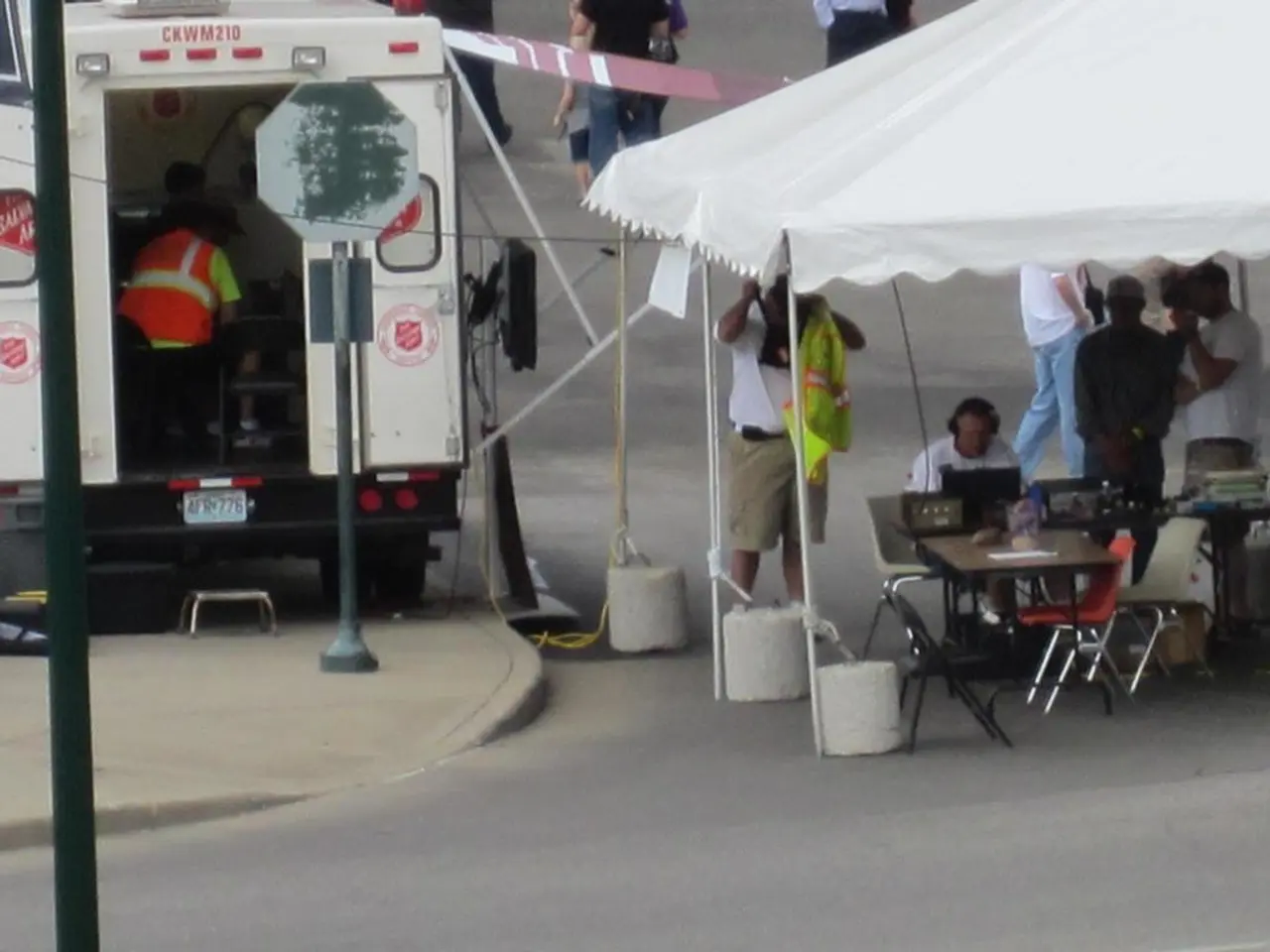Gaza's medical professionals perform surgeries amidst hunger due to blockade exacerbating famine conditions
In the heart of Gaza City, the Eye Hospital stands as a beacon of hope amidst a devastating humanitarian crisis. The city, once bustling with life, is now a shell of its former self, ravaged by relentless military attacks, widespread famine, and the collapse of its healthcare system.
The situation in Gaza City is catastrophic, marked by systematic destruction from intensified Israeli military attacks, widespread famine, and severe shortages of food and medical resources. Healthcare workers, including the dedicated staff at the Eye Hospital, face extreme challenges, including lack of supplies and dangerous working conditions.
Destruction and Civilian Casualties
Israeli forces have escalated assaults specifically targeting Gaza City, notably in the Az Zaytoun neighborhood, with frequent airstrikes, shelling, and gunfire causing massive civilian casualties, including children and entire families. Residential buildings, public facilities, and shelters for displaced persons have been heavily damaged or destroyed.
Displacement and Inhumane Living Conditions
Hundreds of families in Gaza City have fled their homes amid ongoing attacks, with few safe places remaining. Many are sheltering in overcrowded or damaged buildings, schools, and tent camps, often built on rubble or partially burned structures, posing further risks.
Famine and Food Insecurity
For the first time, famine has been confirmed in Gaza, with over half a million people affected by starvation, malnutrition, and a critical lack of food. The situation is worsening, with food consumption levels plummeting and many people, especially vulnerable groups like children and the elderly, going days without eating. The World Food Programme (WFP) continues to provide some food assistance but urgently calls for a ceasefire and sustained humanitarian access to prevent a full-scale famine.
Healthcare System Collapse
Since March 2025, UNRWA and other agencies have been blocked from delivering medicines and medical supplies into Gaza. Healthcare facilities suffer from shortages of essential drugs and equipment, while healthcare workers operate amidst bombardments and scarce resources. Many patients cannot access care due to the destruction and security issues.
Urgent Calls for Ceasefire and Humanitarian Access
UN agencies, including WHO, WFP, FAO, and UNICEF, emphasize the need for an immediate ceasefire and unimpeded humanitarian aid to prevent further deaths from hunger and to allow medical aid to reach those in need.
The doctors at Gaza City's Eye Hospital are working under siege conditions due to Israel's blockade and a perceived starvation policy. Mohammed Al-Tayeb, an ophthalmologist, has been practicing for seven years, but the last two have been the hardest due to perceived systematic starvation. Al-Tayeb, like many of his colleagues, arrives at work on an empty stomach and gets one meal a day. He has lost 10 kilograms (22 pounds) since March due to eating only one meal a day.
The hospital's director, Abdel Salam Sabbah, describes the situation as "difficult and bitter" for medical and administrative teams at Gaza City's Eye Hospital. Doctors are given IV fluids to help them work due to exhaustion and lack of food. Delicate surgeries require high concentration and energy, but doctors' meals are meager. Dr. Maha Daban, a doctor at the hospital, has lost 8 kilograms (18 pounds) due to the blockade and lack of vitamins and proteins. She often feels extreme fatigue, dizziness, and headaches while working.
Dr. Iyad Abu Karsh, head of the anesthesia department, states that malnutrition and food scarcity have caused severe fatigue, especially as working hours have doubled to round-the-clock shifts. Al-Tayeb works double shifts due to the targeting of aid seekers by Israeli forces.
The Gaza Health Ministry reported that within 24 hours on Sunday, hospitals received 35 bodies and 304 wounded aid seekers due to Israeli attacks. Since May 27, a total of 1,778 people have been killed and 12,894 injured in Gaza due to Israeli attacks.
The U.N.'s World Food Program has warned that one-third of Gaza's 2.4 million people have gone days without eating, calling the crisis an "unprecedented" humanitarian collapse. Hundreds of aid trucks are needed daily to stave off famine in Gaza, according to the U.N.
Israel faces a genocide case at the International Court of Justice over its conduct in the Gaza Strip. The humanitarian situation in Gaza City is a stark reminder of the urgent need for a ceasefire and unimpeded humanitarian access to address the crisis and prevent further suffering.
[1] https://www.aljazeera.com/news/2025/3/25/gaza-city-under-intense-israeli-military-attacks [2] https://www.reuters.com/world/middle-east/gaza-health-ministry-says-israeli-attacks-kill-20-wound-60-2025-03-25/ [3] https://www.un.org/apps/news/story.asp?NewsID=62632#:~:text=GAZA%20CITY%20%E2%80%93%20The%20situation,the%20International%20Committee%20of%20the%20Red%20Cross. [4] https://www.who.int/news-room/articles/2025/03/25/un-agencies-call-for-immediate-ceasefire-in-gaza-to-prevent-further-deaths-from-hunger [5] https://www.amnesty.org/en/latest/news/2025/03/israel-gaza-unlawful-attacks-on-civilian-objects-and-indiscriminate-firing-must-stop/
Read also:
- Overweight women undergoing IVF have a 47% higher chance of conceiving naturally post-weight loss
- What temperatures may make walking your canine companion uncomfortable?
- Eye treatments for Drusen: Insights and expansions
- Presidential Candidate Uses Controversial Tactics to Gain Vote, Prompting Outcry From Opponents and Politicians Alike






